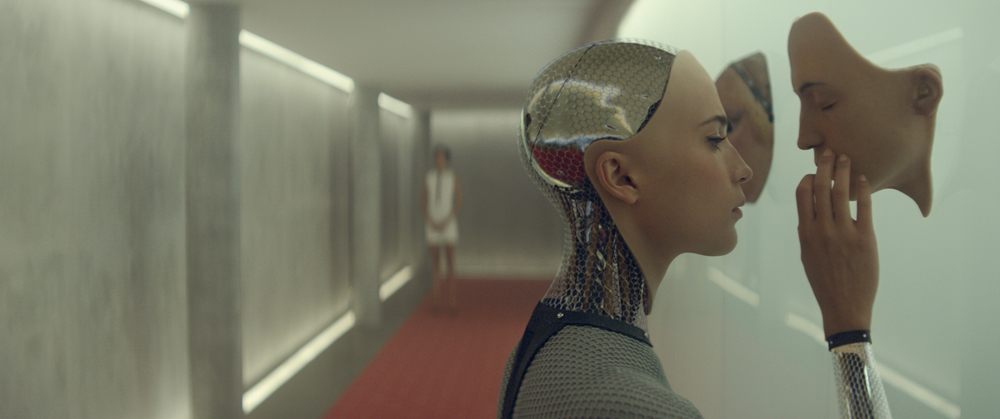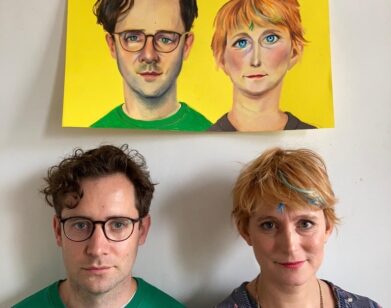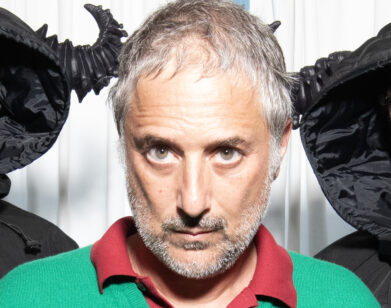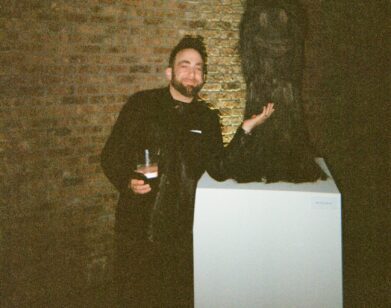Alex Garland
I knew I wanted to write something about AI and a particular kind of AI: strong AI, humanlike consciousness in a machine. Partly because, inevitably, you’ll also talk about people. Alex Garland
When The Beach was published in 1996, the response was swift and convincing: the dark, backpacker-odyssey novel about a secret beach in Thailand and all of the dystopian horrors that come along with colonizing paradise was a critical and popular blockbuster. The Beach was made to summarize a generation of white, globe-hopping Westerners in search of the last unparented, untouched locale, and read like an On the Road for South Asian rambling. Alongside Generation X and Infinite Jest, it was one of the few literary novels of the ’90s to capture the eyes, hearts, and cynicism of post-post-yuppie youth culture. The novelist, Alex Garland, age 26 at the time of the book’s release, received the kind of attention and praise novelists rarely attract—and that was exactly what Garland never wanted.
Although the British writer did publish another novel soon after, 1998’s The Tesseract, also set abroad and full of taut, enviable prose, Garland did the near career impossible: he returned his lucrative book-deal advance to begin a second act as a screenwriter. Not many writers have had success in both book publishing and screenwriting, but Garland penned two outstanding original screenplays, 28 Days Later (2002) and Sunshine (2007), which also teamed him up with Danny Boyle, the director responsible for bringing The Beach to the screen. Both scripts continued Garland’s interest in themes of civilization and madness, isolation and contamination, but a certain sci-fi obsession began to imbed itself in his projects. He continued in the screenwriting vein, writing and even producing the adaptation of Kazuo Ishiguro’s novel Never Let Me Go in 2010. But it seemed inevitable that Garland would keep morphing and surprising, and this month marks the U.S. release of his first film in the role of director. Ex Machina, which he also wrote, is filled with great Garlandian themes, now applied to questions of consciousness, the ethics of creation and replication, and specifically, the ever-narrowing asymptotic humanness of artificial intelligence.
The story revolves around a young computer programmer (Domhnall Gleeson) who travels to the remote Alaskan bunker of a macho, genius (and possibly mad) internet billionaire (played brilliantly by Oscar Isaac) to perform a sort of face-to-face emotional and psychological Turing test on a beautiful AI named Ava (Alicia Vikander). Garland’s AI exploration is no cautionary tale, nor is it a reductive case of humans versus their robot replacements. The director approaches from all sides and hovers us alongside the moral and ethical consequences. Garland is keenly aware of the social anxiety surrounding AI, and he cleverly channels that unease through Ava’s slow seduction on the programmer and on the audience. What results is a dangerous thriller about what it means to be human—its creation and its destruction—and like the exquisite design of Ava, the film is a landmine wrapped in a super-sleek shell. The billionaire’s pristine mountain bunker is about as far as you can get from the Unabomber’s shack, but I’m reminded of Ted Kaczynski’s idea that all new technologies first present themselves as options until they become mandatory in order to participate in society. That makes the anxiety over artificial intelligence all the more pronounced and the blurring of sci-fi and reality all the more interesting. I spoke to Garland by phone in London, where he lives with his wife and two children. I wasn’t sure he’d be willing to talk about Thailand.
CHRISTOPHER BOLLEN: I’m a big admirer of your novel The Beach. So I hope you don’t mind if I start out with a few questions about it. I hope it isn’t one of those topics that you’re sick of talking about at this stage of your career.
ALEX GARLAND: No. I mean, that was almost 20 years ago. I never talk about it.
BOLLEN: It’s not a weight you can never get free from?
GARLAND: Not really. The truth is, I hadn’t grown up really wanting to be a writer. The whole thing was a weird aberration in some ways, and I didn’t feel personally connected to the level of success I had with it—the success of sorts, I guess.
BOLLEN: It was a huge success.
GARLAND: Yeah, but I didn’t feel it was particularly connected to me, partly because of the strange timing of books where they’re often written years before they’re actually published. By the time it came out, in 1996, I was already deep into a different project. But The Beach was a pre-internet book, really. It was a word-of-mouth book.
BOLLEN: Exactly. It was the last of its kind in a way. It’s like how we used to learn about albums or bands. Slowly, through our friends.
GARLAND: I was talking about that phenomenon with one of the guys who wrote the soundtrack for Ex Machina. We’ve got a shared love of an old German band called Can—a kind of krautrock, prog-rock band from the late ’60s and early ’70s. When I discovered them, you couldn’t go online. You couldn’t find anything about them at all. Nor were they very popular. So it was really hard to get information. You’d accumulate little bits of gossip or hearsay over the years, and a lot of it was completely wrong. Everything’s different now.
BOLLEN: It’s like if you had a friend who died before the internet. If you try to google them, there’s no trace of them. They feel doubly gone. It’s such a strange thing, that absence in our digital world. Anyway, moving away from the macabre, how did you end up writing The Beach if you never wanted to be a writer? Because writing a novel isn’t exactly fun; it’s a painful, hellish experience in many ways.
GARLAND: Right. So why did I do it? I did it because I had a fantasy or an aspiration that I was going to be a journalist, specifically a foreign correspondent. I felt that job would allow me to travel and work and the private passion would mix perfectly. And while I was in Asia, I’d go out with the idea that I’d witness some event or demonstration or way of life with the idea of writing about it for newspapers back in the U.K. But I discovered I couldn’t do it. I found the perceived objective requirements of writing nonfiction really paralyzing. Often I wasn’t exactly sure what happened with particular events, or my sense of what they were would shift a lot. I had an urge just to make stuff up, basically. I sort of felt more comfortable with that idea. I guess I accumulated a bunch of stories just by virtue of having tried to put myself in front of them. I started writing them down. My first attempt at writing was very unstructured and formless, with shifting points of view. I was trying to understand how long form might work, and I realized I had something shapeless. It was a total car wreck. But I still felt I could pull it off. So I ditched that attempt and started writing in the opposite manner, in first person, with a driving narrative. I would literally pull books off the shelves and try to figure out how you attribute dialogue from one character to another. It would be fine if there were two people talking, but really hard if there were three. I would engineer a lot of scenes where there tended not to be three people talking because it was too hard. [laughs] People in The Beach are always going off and talking together.
BOLLEN: One of the things I find so brilliant about The Beach—and actually you do this in your screenplays as well—is that the action starts almost immediately. You don’t weigh the narrative down with a bunch of elaborate, overly resolved backstories. The character starts moving on page one.
GARLAND: The two most common editorial notes I’ve had in films or in novels has been, “There’s not enough backstory,” and “It’s too detached,” that everything is kind of floating off what’s happening. So I’m pleased you say that. I think, again, this comes from being slightly untrained in some respects, but I never feel a huge need for backstory. Quick sketches are often enough. When you encounter people in life—like a chance encounter at a bar or wherever you happen to be—you make these incredibly quick, quite intricate decisions about people based on very small amounts of coded information. We’re good at that. Long descriptions prior to meeting someone or as you’re getting to know them almost don’t work.
BOLLEN: I guess now we google everyone before we meet them, so there is some backstory or frame.
GARLAND: But you almost never find out anything helpful.
BOLLEN: So when The Beach became such a huge hit, how did you react to that?
GARLAND: If I had been in a car, essentially what I did was I threw the car into reverse and floored it. That’s what I did. I finished the book I was working on at the time, The Tesseract, also set abroad, and I delivered it. I had a contract to write two more books that had been negotiated by my agent as The Beach took off. So, whereas The Beach was a small deal, this was a lucrative deal. I thought about it hard and realized, “I actually don’t want to do this. Take the money back.” People around me thought I was insane. I think the publishers thought I was insane.
BOLLEN: No one gives back the golden egg once it’s given.
GARLAND: Yeah. But that was very oppressive because of a work-ethic-type thing that just said I now have to deliver and I don’t want to deliver it. That was the thing. I don’t want to do it. And I didn’t like being inspected. I didn’t like being a name attached to a book. I just found it weird, so I gave the money back and I moved into film. I remember I had a lunch with one of the publishers, and they said, “Well, what are you doing?” I said, “I started writing a zombie film,” which was the movie 28 Days Later, which I did with guys who had done the film adaptation of The Beach. But even as I was saying it, I was thinking, “I get it. I know this sounds really weird. Like I’m paying back this money, and I’m saying, ‘Oh, now I’m going to go write a zombie movie.’ It’s just nuts. It doesn’t compute.” But to me, it made total sense at the time, and then retrospectively, it does as well.
BOLLEN: Have you been back to Thailand?
GARLAND: Once. And I discovered it was not a good place for me to be in some respects because I got really antsy about the idea that someone would recognize me.
BOLLEN: I went to Thailand three years ago, and the bookstore in the airport had an entire wall of The Beach and another wall of Bangkok 8. Those were still the two books of Thailand—like the ultimate travel advertisements for the country.
GARLAND: Genuinely, very, very strange.
BOLLEN: [laughs] Well, most novels have a shelf life of a week if they’re lucky. Anyway, when you moved over from novels to screenplays, did you feel like you had to prove yourself all over again?
GARLAND: The key relationship for writers in film is producers, because those are the first two people involved and the ones who work on it intensely in a private way without the big machinery of film. So I wrote a script. Film allows me to play out this writing compulsion I’ve now developed. But it’s more anonymous in some respects, or most respects, than novel writing. I wrote a first draft of 28 Days Later, and I showed it to this guy Andrew Macdonald—who is a producer and is the producer I’ve continued to work with since—and he said, “There’s something in this but, look, it’s formatted all wrong and these scenes are way overwritten.” He gave me a script and said, “This is what a script looks like.” It was a bit like novel writing in the very early days, where I would be looking at it in a mechanical, structural way—you know, interior, exterior, all the stuff like that—but also economy, where you can come out of a scene and where you can come in and all sorts of things that play differently than they do in books. There’s one massive problem with coming from writing novels into screenplays that I’ve discovered over the years, which is that you’ve got too much facility on the page. In novels, you can persuade people of things that work that don’t really work.
BOLLEN: Because you’ve got more time and room to make a case.
GARLAND: Yeah. I can kid people, including myself, into believing that something on the page will work. But when you film it, you just think, “Oh …”
BOLLEN: You have to be a better salesman with script writing.
GARLAND: Or you have to be a less good salesman. And I got slightly too good at that.
BOLLEN: You can also fall back on style in novel writing. You can make something sound great that really, objectively, doesn’t hold water.
GARLAND: Exactly. They’re like card tricks and distraction techniques, for sure.
BOLLEN: I know you’ve had a love of video games since you were a kid. Is there anything edifying about video games that helped you in terms of writing or directing?
GARLAND: I don’t think so, except that it’s just stuff, you know? It’s input, and you draw on everything eventually in some way. But until fairly recently, video games have almost been anti-writing. I used to think about video games, “This is clearly an amazing, new narrative medium, and it’s going to be mind-blowing when people get to grips with what’s possible within this medium.” You know, it took us a century to get really good at film. Video games are at a much earlier stage. There’s a game that came out a couple years ago called The Last of Us on the PlayStation system that has very, very good writing and very good performances in it. It’s within the zombie genre. Suddenly, you think, “Oh my God …” It’s worth having a look at. It’s a bit like The Road. It’s a bereaved father who is tasked with the care of a girl; it’s him just trying to keep her alive in this environment. What the writers and game-makers did with that gets increasingly sophisticated and interesting, and it demonstrates what games will be able to do. And the really cool thing is that it doesn’t just demonstrate the potential; it then actually achieves a lot of that potential.
BOLLEN: You mean like more along the lines of Choose Your Own Adventure, in that it gives players more choices and free will?
GARLAND: The thing video games had to learn was to write, which is not to let people choose their own stuff, but actually prescribe it. To say, “This character is not a blank canvas that you can project onto. I’m going to tell you what this character is like. And I’m going to tell you what happens to them. You’re going to feel involved in other ways.” Video games made the mistake of thinking everything had to be projectable, and this doesn’t do that at all.
BOLLEN: I play online chess. But I don’t play against the computer, because its near infallibility bores me. I like the human player, the mistake-prone player. It’s more fun. This gets at Ex Machina, or making a machine that appears as close to human as possible. You even bring up the computer-chess model in the film. Obviously, there are a lot of themes in this film similar to your past work—utopias ruined by those who conceive them, containment, perfection, madness, scientific exploration, youth. What brought you to writing this story?
GARLAND: I knew I wanted to write something about AI and a particular kind of AI: strong AI, humanlike consciousness in a machine. Partly because, inevitably, you’ll also talk about people. If you’re talking about Siri, or the AI you get in a mobile phone or in a car that parks itself, you’re not necessarily talking about people at all. But if you’re talking about an attempt to create self-aware machines, then inevitably you’re talking about consciousness as well. Typically what happens to me, and maybe this comes out of when I was thinking of being a journalist, is that stories come out of a kind of agenda. I’ll have an agenda about backpacking or about atheism or about consciousness or whatever it happens to be. The thing begins like an argument in my head, and in this case it actually was a literal argument because I had gotten particularly interested in the potential of computers to have minds through having rolling discussions with a friend of mine whose key area is neuroscience. He’s of the opinion that computers can never have minds for some very specific reasons—and there’s a very good set of arguments behind them, and he could easily be right—but on an instinctive level, I kept thinking, “No, he’s wrong, because we are machines.” And that allows for the possibility of creating a machine that can do the same thing. If you have a sort of physicalist view of what we are, then, in theory, it leaves the option open to create a sentient machine. So I began reading about it, and the story just floated out of that. The story is the playing out of some of the arguments, sometimes quite explicitly because it talks about the Mary’s Room thought experiment. [First described by Frank Jackson in 1982, this imagines a woman who knows the physical facts of color perception and yet has lived her whole life in a colorless room.] There’s an overt conversation about that within the film.
BOLLEN: I was thinking about one popular concept while watching the film, which is that what machines are good at is thinking fast. But what they so far have failed in doing is thinking slow, and that’s where they haven’t approached the human brain. They can’t puzzle over something, rethink it, unthink it, find another way. You presented Ava, the AI, who in some ways does think slow.
GARLAND: Computers can perform a single set task very well. They can find one number out of a million telephone numbers, where it would take us ages. But what the computer really struggles with is general intelligence. Like, as you and I are talking, I’m leaning back on my chair, I have a coffee that I’m sipping every now and then, I’m looking out the window at clouds. There are complicated motor skills going on and I’m reacting to the entire environment. Computers don’t. But really what I was interested in was that the problems of this machine that looks like a girl are basically the same problems we have. I wanted to begin with machines and quickly jump to people.
BOLLEN: It must have been interesting to write the character of Ava. How do you make a character that is trying to be human? Obviously, you wanted us to have empathy for her, but there’s always a chance in building a humanlike robot that what you’re really building is the perfect sociopath.
GARLAND: Humans can mimic being humans as well.
BOLLEN: Exactly. Ted Bundy’s friends probably felt like they knew a human being.
GARLAND: The way I wrote Ava was quite simple, really. I was in love with her—that’s the thing. This was all about how amazing an AI could be, how desirable and fascinating. Whereas most narratives come from a position of anxiety about AIs, mine was the opposite. So I wrote it as a writer in love with a robot girl, or a robot who looks like a girl. Really, it’s a love letter to her. The film is always battling on her side.
BOLLEN: Certainly Ex Machina is not the usual cautionary tale about robots replacing humans. But you do leave room for doubt about whether Ava is really innocent or a master manipulator.
GARLAND: It’s a complicated argument, and I’m not sure what the correct answer is. I’ve got my feeling, and I can present it, but I had to at least acknowledge the weight of the other side of the argument. Take, for instance, The Beach: I wrote it as being a kind of criticism of aspects of the whole backpacker culture and the way we use Southeast Asia as a kind of Disneyland of late adolescence. But some people took the novel as a celebration of backpacker culture. So I’m used to the idea that your intentions might not play out the way you thought they would. So now I try to accommodate that role because I don’t want the film to be a diatribe. If people see this film and say to me, “What you’ve done is demonstrate that robots are bad, and they have no empathy.” That’s a response. It’s not my response, but it could be other people’s. Also empathy can be selective. Ava may not always be empathetic, but that doesn’t mean she’s doesn’t have that capacity.
BOLLEN: It sort of goes without saying that the audience is always going to be on the side of the humans.
GARLAND: At this moment, there is so much anxiety about AI, and it’s being played out in a public debate. I think it’s partly because people are scared of tech companies and they aren’t sure what information about themselves they’ve given up to the NSA. But where sentient machines are concerned, I just don’t share that anxiety. I see the creation of a new kind of consciousness as a kind of progression of our existence.
BOLLEN: When it came to the visuals, specifically the look of Ava, were there any sources of inspiration in science fiction or film?
GARLAND: I was avoiding previous images of AI, because when Ava first appears on the film, I didn’t want the audience thinking about C-3PO or Metropolis [1927]. I wanted them to engage with her as a new character in the moment and not do that thing that films do a lot, which is coyly reference other movies. Film is also different from books in that way. With books, you can’t assume any particular amount of widespread literacy in terms of what people have read. In films you can. So not all readers have read Heart of Darkness, but most film fans have watched Apocalypse Now [1979]. You can trust most have seen Blade Runner [1982] and 2001 [1968]. Very often if you present a film that contains sentient machines, that film is going to be positioned in relation to the previous ones. The one that has cast the longest shadow is definitely HAL in 2001.
BOLLEN: It’s like Watson, the IBM supercomputer on Jeopardy! It was hard to relate to him because he had no face, no body. He was just this ghostly mechanical voice from dead library reserves. He wasn’t relatable as anything but an answer generator. Ava on Jeopardy! would have had a very different effect, maybe a terrifying one. This is the first film you directed, but certainly this wasn’t your first time on a movie set. You knew the method of moviemaking pretty intimately for a first-time director.
GARLAND: I’ve been on a movie set a lot. And I think there tends to be a lot of false assumptions about filmmaking that are at odds with my experience of it. Perhaps it’s because I arrived in filmmaking from novel writing, but it was hard to convince me that the director is the sole author of a film, especially when I knew that the director hadn’t come up with the characters, the story, the themes, the dialogue, what people were saying, and where they were saying it. I just thought, “Come on, nope.”
BOLLEN: I sometimes fall into that trap myself. I conflate the director with the cinematographer. I forget that the director isn’t the DP.
GARLAND: Very experienced film critics do that all the time. They talk about how a director mounted a camera, right? Now, it could be the case that a director did mount the camera. There are some directors who are essentially DPs. That exists, but it’s definitely not across the board, and it’s not something I’ve ever personally observed. I’m not saying auteurs don’t exist. If somebody says to me, “Woody Allen is an auteur,” I’m not going to launch into some lengthy discussion about how he’s not. That’s fine. But broadly speaking, cinema is collaborative, and the huge list of names that appear after the film is over—they’re not there by accident. I can give specific examples of things that will be attributed to me on this film that really have nothing to do with me. They’re to do with the way the person who arranges the props on the set said to me, “Hey, look how cool this would be if we did that.” And I go, “Oh, yeah. That would be cool.”
BOLLEN: It’s beautifully shot. You must have had something to do with the overall look of the film.
GARLAND: A few years ago I worked on this film called Never Let Me Go, which is an adaptation of a British novel by Kazuo Ishiguro. While we were cutting the film, I began to get really alarmed by something, which was that we had successfully hit the tone, we hit the tone quite beautifully and elegantly, but we were stuck in that tone, and what we were needing at times was heat.
BOLLEN: I recall that film being very brown and gray.
GARLAND: Exactly. And for this film, I very consciously thought, “This is a movie of ideas, and it could easily be like Never Let Me Go.” I thought, “Watch it, and be careful.” So there’s a heat in there. Some of the heat in there is sexual, and some of the heat is in softness. It’s not the clinical, hospital sci-fi, nor is it the blue collar, dirt under the fingernails of Alien [1979]. It’s a soft, warm, slightly seductive sci-fi. It’s a different kind of thing. And then there are these moments of irreverence and aggression, like suddenly popping a disco scene in there just to jolt people. Then just as people are digging the track and thinking, “These two can dance!” you cut slightly too early and make it a little jagged. It could so easily be a kind of calm, Zen, monotone. I wanted to avoid that. I didn’t want people burning down the cinema halfway through the running time.
CHRISTOPHER BOLLEN IS INTERVIEW’S EDITOR AT LARGE. HIS SECOND BOOK, ORIENT, IS OUT THIS MAY.







